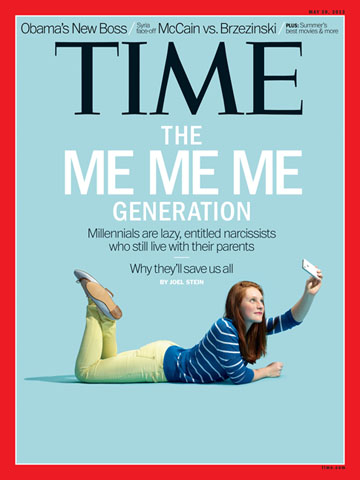
(5 of 8)
For example, millennials' perceived entitlement isn't a result of overprotection but an adaptation to a world of abundance. "For almost all of human history, almost everyone was a small-scale farmer. And then people were farmers and factory workers. Nobody gets very much fulfillment from either of those things," says Jeffrey Arnett, a psychology professor at Clark University, who invented the phrase emerging adulthood, which people foolishly use instead of the catchy twixters. Twixters put off life choices because they can choose from a huge array of career options, some of which, like jobs in social media, didn't exist 10 years ago. What idiot would try to work her way up at a company when she's going to have an average of seven jobs before age 26? Because of online dating, Facebook circles and the ability to connect with people internationally, they no longer have to marry someone from their high school class or even their home country. Because life expectancy is increasing so rapidly and technology allows women to get pregnant in their 40s, they're more free to postpone big decisions. The median age for an American woman's first marriage went from 20.6 in 1967 to 26.9 in 2011.
And while all that choice might end in disappointment, it's a lottery worth playing. "I had one grandfather fight in the Pacific and one in the Atlantic theater. One became a pilot; one became a doctor. When you grow up during the Great Depression and fight off the Nazis, you want safety and stability," says Tucker Max, 37, who set an example for millennials when instead of using his Duke law degree to practice law, he took his blog rants about his drunken, lecherous adventures and turned them into a mega-best-selling book, I Hope They Serve Beer in Hell, that he got an independent publisher to print. "Everyone told you that everyone above you had to s--- on you before you got to s--- on people below you. And millennials didn't want to do that."
In fact, a lot of what counts as typical millennial behavior is how rich kids have always behaved. The Internet has democratized opportunity for many young people, giving them access and information that once belonged mostly to the wealthy. When I was growing up in the 1980s, I thought I would be a lawyer, since that was the best option I knew about for people who sucked at math in my middle-class suburb, but I saw a lot more options once I got to Stanford. "Previously if you wanted to be a writer but didn't know anyone who is in publishing, it was just, Well, I won't write. But now it's, Wait, I know someone who knows someone," says Jane Buckingham, who studies workplace changes as founder of Trendera, a consumer-insights firm. "I hear story after story of people high up in an organization saying, 'Well, this person just e-mailed me and asked me for an hour of my time, and for whatever reason I gave it to them.' So the great thing is that they do feel entitled to all of this, so they'll be more innovative and more willing to try new things and they'll do all this cool stuff."
